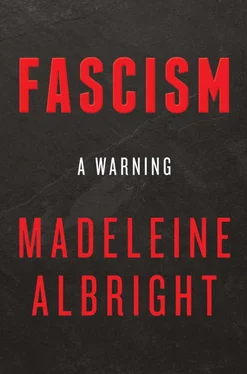So here’s what doesn’t make sense. In November 2016, Obama’s favorability rating was the highest of his presidency—and yet the American Electoral College rewarded a candidate who insisted that the United States was going to hell.
The puzzle is not limited to 2016 or to one country. In Russia, the rise of Putin can perhaps be explained by the disasters of the 1990s. In 2002, when Erdoğan first ran for president, he seemed a savior compared to the weary old misfits who had run Turkey into the ground.
More recently, however, the sources of discontent are less evident or less weighty. Countries such as Hungary, Poland, and the Philippines are not in unusually dire economic straits, nor have they suffered a recent historical trauma. Further, the world is by many measures in better shape now than it has ever been. Infants born today are more likely to begin life healthy, more likely to receive the necessary vaccines, more likely to have access to an education, and more likely to reach old age than those in any prior generation. World Bank figures show that the global rate for extreme poverty has dipped below 10 percent for the first time. Partnerships between aid agencies and the private sector have yielded immense dividends by broadening the availability of medicine, tackling malaria and HIV/AIDS, and increasing access to electricity and modern communications. The international system has an abundance of flaws, and the Syrian refugee crisis stretched its humanitarian capacity beyond the breaking point, but professionals in the fields of development, public health, and refugee care have never done more good in as many places or for as large a number of people.
Yes, salaries remain too flat, and we have much work ahead to provide jobs for the next generation and the next. There is no cause to be satisfied, but neither should we fall under the spell of believing that authoritarianism is somehow a more practical option. One might ask: Well, what about China? Its rise has contributed much to global gains, but that is because three decades ago, the leaders in Beijing decided to open their economy and embrace many of the principles of free enterprise. China is a major player not because it’s the master of its own game but because its people are so adept at capitalism.
CONSIDER ALL THE DEMANDS THAT ARE PLACED ON GOVERNMENT, then factor in the gargantuan changes that have taken place in the past seven decades: the end of colonialism, the lifting of the Iron Curtain, the narrowing of the North–South divide, the revolution in technology, and the increased mobility of people. By any objective standard, democracy—though everywhere tested—has not failed and is not failing. Why, then, do we feel so often that it has and is?
In my twenty-plus years as a professor, I have learned to ask myself, when I am not getting good answers, whether it is because I haven’t been looking in the right places. I wonder now whether we, as democratic citizens, have been remiss in forming the right questions. Maybe we have grown so accustomed to receiving immediate satisfaction from our devices that we have lost patience with democracy’s sluggish pace. Possibly, we have allowed ourselves to be manipulated by hucksters who pledge to deliver the world on a silver platter but have no clue how to make good on their promises. Perhaps we have been letting appearances—the illusion of decisiveness, the breathless reporting of trivia, the faux drama of reality TV—deceive and confuse us to the point that we can’t recognize what is true, and instead believe with certainty what is not. The moment may be right to take a time-out and consider more carefully what we really mean when we talk about such concepts as greatness and strength.
FEW INCOMING AMERICAN PRESIDENTS WERE MORE WIDELY scorned than Abraham Lincoln. Critics in the southern states were predictably abusive, but leading northern politicians—even from his own party—called him “vacillating & inefficient,” “weak as water,” and “an admitted failure [who] has no will, no courage, no executive capacity.” The chorus grew louder when, for security reasons, he wore a low-crowned hat and capacious overcoat to avoid being recognized while changing trains en route to Washington for his inauguration. Apparently the new president was not only—among the other epithets directed at him—a bumpkin, yahoo, gorilla, and idiot; he was also a coward. Four years later, when leaping from the balcony at Ford’s Theatre, John Wilkes Booth called him a tyrant.
In his impact on the times during which he served, no U.S. chief executive was more divisive than Lincoln, yet today he is one of the handful of presidents revered by Republicans, Democrats, historians, and everyday citizens in all parts of the country and by many millions across the globe. History long ago judged him a strong leader, but not because he professed to be. While the object of much ridicule himself, Lincoln never mocked the downtrodden, nor bragged of his own accomplishments, nor exhibited personal cruelty. He was a savvy politician who could play rough and whose wartime policies compromised civil liberties, but his true aim—to save a nation from the ugliness of its own worst passions and policies—never wavered.
As a communicator, he was an original who demanded more from the American people and spoke to them with greater frankness than any president before or since. His plea when the war began was directed toward the “better angels of our nature” and, when the conflict was winding down, to the principles of “malice toward none” and “charity for all.” He told a nation burdened by sorrow to consider the possibility that it had—by tolerating slavery for so long—invited its own Armageddon. He urged those with a thirst for vengeance to concentrate instead on binding up the nation’s wounds and caring “for him who shall have borne the battle, and for his widow and his orphan.”
A century later, and across an ocean to the east, Nelson Mandela began serving twenty-seven years, the prime of his life, in prison. His crime was to oppose the racist oppressors who had secured a monopoly on power and privilege in his country. The courageous dissident had a profound cause for grievance, a legitimate reason for bitterness, and thousands of days behind bars to cultivate hate. Instead he chose to spend time learning about the people who had put him in jail—the Afrikaners. He studied their language, history, resentments, and fears. When the long-awaited day came and he was finally released, Mandela not only understood those who had thrown him into prison; he was able to communicate with them, find common ground with them, forgive them, and—most astonishingly—lead them. As president, Mandela pushed back against the many in his party who wanted immediate justice for the multitude of wrongs done to members of the anti-apartheid movement. He appointed a Truth and Reconciliation Commission that received testimony from all sides. Unlike so many, he found the trappings of high office eminently resistible and refused to stand for a second term. In his valedictory address to the United Nations, he said:
As I sit in Qunu and grow as ancient as its hills, I will continue to entertain the hope that there has emerged a cadre of leaders in my own country and region, on my continent and in the world, which will not allow that any should be denied their freedom as we were; that any should be turned into refugees as we were; that any should be condemned to go hungry as we were; that any should be stripped of their human dignity as we were.
Lincoln and Mandela each fought with monsters; neither became one.
SOME MAY VIEW THIS BOOK AND ITS TITLE AS ALARMIST. GOOD. We should be awake to the assault on democratic values that has gathered strength in many countries abroad and that is dividing America at home. The temptation is powerful to close our eyes and wait for the worst to pass, but history tells us that for freedom to survive, it must be defended, and that if lies are to stop, they must be exposed.
Читать дальше
Конец ознакомительного отрывка
Купить книгу












